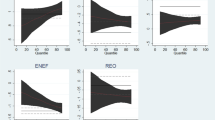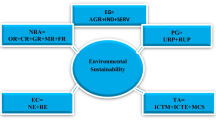Abstract
The need to halt the pervasive issue of global warming has triggered commitments from policymakers, international organizations, and research pundits with an ambitious goal of neutralizing carbon emissions, forming the core of COP26 in November 2021. Consequently, the carbon neutrality agenda is globally debated in the environment and economic growth literature. Given the preceding narratives, this study examines the tripartite effects of energy consumption, resource dependence, and trade openness on carbon neutrality in G20 economies from 2001 to 2019. The empirical evidence relies on homogenous and heterogeneous dynamic models based on a system generalized method of moments (GMM), fully modified ordinary least squares (FM-OLS), and quantile regression estimators. The following results are evident from the empirical analyses. Among the heterogeneous indicators, nonrenewable energy, oil rents, coal rents, and imports contribute to the surge in carbon emissions, while renewable energy, gas rents, and exports moderate carbon emissions. The homogenous impacts show that total energy consumption, total natural resource rents, and trade openness promote significant carbon emissions. Further, the long-run results from FM-OLS and the disintegrated mean effects from quantile regression are robust for the main short-run results based on the two-step system GMM. Based on the empirical fallout, investing in renewable energy and diversifying from natural resource exploration are among the emanating policy that can enhance the sustainability of the G20 environment.
Similar content being viewed by others
Data availability
The datasets generated during and/or analyzed during the current study are available in: World Bank Development Indicators (WDI): https://databank.worldbank.org/source/world-development-indicators.
References
Adebayo TS, Oladipupo SD, Rjoub H et al. (2022) Asymmetric effect of structural change and renewable energy consumption on carbon emissions: designing an SDG framework for Turkey. Environ Dev Sustain. https://doi.org/10.1007/s10668-021-02065-w
Ajide KB, Ibrahim RL (2021) Threshold effects of capital investments on carbon emissions in G20 economies. Environ Sci Pollut Res 28(29):39052–39070
Ali M, Kirikkaleli D (2022) The asymmetric effect of renewable energy and trade on consumption-based CO2 emissions: the case of Italy. Integr Environ Assess Manag 18(3):784–795. https://doi.org/10.1002/ieam.4516
Arellano M, Bover O (1995) Another look at the instrumental variable estimation of error-components models. J Econ 68(1):29–51. https://doi.org/10.1016/0304-4076(94)01642-D
Blundell R, Bond S (1998) Initial conditions and moment restrictions in dynamic panel data models. J Econ 87(1):115–143. https://doi.org/10.1016/S0304-4076(98)00009-8
Caglar AE, Balsalobre-Lorente D, Akin CS (2021) Analysing the ecological footprint in EU-5 countries under a scenario of carbon neutrality: evidence from newly developed sharp and smooth structural breaks in unit root testing. J Environ Manage 295:113155. https://doi.org/10.1016/j.jenvman.2021.113155
Chopra R, Magazzino C, Shah MI, Sharma GD, Rao A, Shahzad U (2022) The role of renewable energy and natural resources for sustainable agriculture in ASEAN countries: do carbon emissions and deforestation affect agriculture productivity? Resour Policy 76:102578
COP26 (2021) The negotiation explained. Available at https://ukcop26.org/wp-content/uploads/2021/11/COP26-Negotiations-Explained.pdf. Retrieved on Thursday, April 21, 2022
Dong F, Li Y, Gao Y, Zhu J, Qin C, Zhang X (2022) Energy transition and carbon neutrality: exploring the non-linear impact of renewable energy development on carbon emission efficiency in developed countries. Resour Conserv Recycl 177:106002. https://doi.org/10.1016/j.resconrec.2021.106002
Gudde P, Oakes J, Cochrane P, Caldwell N, Bury N (2021) The role of UK local government in delivering on net zero carbon commitments: you’ve declared a Climate Emergency, so what’s the plan? Energy Policy 154:112245. https://doi.org/10.1016/j.enpol.2021.112245
Gyamfi BA, Onifade ST, Nwani C, Bekun FV (2022) Accounting for the combined impacts of natural resources rent, income level, and energy consumption on environmental quality of G7 economies: a panel quantile regression approach. Environ Sci Pollut Res 29(2):2806–2818. https://doi.org/10.1007/s11356-021-15756-8
Hou H, Wang J, Yuan M, Liang S, Liu T, Wang H, Xu H (2021) Estimating the mitigation potential of the Chinese service sector using embodied carbon emissions accounting. Environ Impact Assess Rev 86:106510. https://doi.org/10.1016/j.eiar.2020.106510
Ibrahim RL, Ajide KB (2020) Trade facilitation, institutional quality, and sustainable environment: renewed evidence from Sub-Saharan African countries. J Afr Bus, 1–23. https://doi.org/10.1080/15228916.2020.1826886
Ibrahim RL, Ajide KB (2021a). The dynamic heterogeneous impacts of nonrenewable energy, trade openness, total natural resource rents, financial development and regulatory quality on environmental quality: evidence from BRICS economies. Resour Policy, 74102251
Ibrahim RL, Ajide KB (2021b) Nonrenewable and renewable energy consumption, trade openness, and environmental quality in G-7 countries: the conditional role of technological progress. Environ Sci Pollut Res 28(33):45212–45229. https://doi.org/10.1007/s11356-021-13926-2
Ibrahim RL, Ajide KB (2021c) Disaggregated environmental impacts of non-renewable energy and trade openness in selected G-20 countries: the conditioning role of technological innovation. Environ Sci Pollut Res 28(47):67496–67510
Ibrahim RL, Ajide KB (2022) Trade facilitation and environmental quality: empirical evidence from some selected African countries. Environ Dev Sustain 24(1):1282–1312
Ibrahim RL, Julius OO, Nwokolo IC, Ajide KB (2022) The role of technology in the non-renewable energy consumption-quality of life nexus: insights from sub-Saharan African countries. Econ Chang Restruct 55(1):257–284. https://doi.org/10.1007/s10644-020-09312-6
Iqbal S, Wang Y, Shaikh PA, Maqbool A, Hayat K (2022) Exploring the asymmetric effects of renewable energy production, natural resources, and economic progress on CO2 emissions: fresh evidence from Pakistan. Environ Sci Pollut Res 29(5):7067–7078. https://doi.org/10.1007/s11356-021-16138-w
Khan SAR, Ibrahim RL, Al-Amin AQ, Yu Z (2022a) An ideology of sustainability under technological revolution: striving towards sustainable development. Sustainability 14(8):4415. https://doi.org/10.3390/su14084415
Khan SAR, Quddoos MU, Akhtar MH, Rafique A, Hayat M, Gulzar S, Yu Z (2022b) Re-investigating the nexuses of renewable energy, natural resources and transport services: A roadmap towards sustainable development. Environ Sci Pollut Res 29(9):13564–13579
Khan AA, Khan SU, Ali MAS, Safi A, Yuling G, Ali M, Luo J (2022c) Role of institutional quality and renewable energy consumption in achieving carbon neutrality: case study of G-7 economies. Sci Total Environ 152797
Ling G, Razzaq A, Guo Y, Fatima T, Shahzad F (2022) Asymmetric and time-varying linkages between carbon emissions, globalization, natural resources and financial development in China. Environ Dev Sustain 24(5):6702–6730
Oke DM, Ibrahim RL, Bokana KG (2021) Can renewable energy deliver African quests for sustainable development?. J Dev Areas 55(1). https://doi.org/10.1353/jda.2021.0022
Pedroni P (1996) Fully modified OLS for heterogeneous cointegrated panels and the case of purchasing power parity. Manuscript, Department of Economics, Indiana University 5:1–45. Available at https://web.williams.edu/Economics/pedroni/WP-96-20.pdf. Accessed 4 May 2022
Qin L, Kirikkaleli D, Hou Y, Miao X, Tufail M (2021) Carbon neutrality target for G7 economies: examining the role of environmental policy, green innovation and composite risk index. J Environ Manage 295:113119. https://doi.org/10.1016/j.jenvman.2021.113119
Rahman HU, Zaman U, Górecki J (2021) The role of energy consumption, economic growth and globalization in environmental degradation: empirical evidence from the BRICS region. Sustainability 13(4):1924. https://doi.org/10.3390/su13041924
Razzaq A, Wang Y, Chupradit S, Suksatan W, Shahzad F (2021) Asymmetric inter-linkages between green technology innovation and consumption-based carbon emissions in BRICS countries using quantile-on-quantile framework. Technol Soc 66:101656. https://doi.org/10.1016/j.techsoc.2021.101656
Roodman D (2009) A note on the theme of too many instruments. Oxford Bull Econ Stat 71(1):135–158. https://doi.org/10.1111/j.1468-0084.2008.00542.x
Safi A, Chen Y, Wahab S, Zheng L, Rjoub H (2021) Does environmental taxes achieve the carbon neutrality target of G7 economies? Evaluating the importance of environmental R&D. J Environ Manage 293:112908. https://doi.org/10.1016/j.jenvman.2021.112908
Sakyi D, Villaverde J, Maza A, Bonuedi I (2017) The effects of trade and trade facilitation on economic growth in Africa. Afr Dev Rev 29(2):350–361. https://doi.org/10.1111/1467-8268.12261
Salvia M, Reckien D, Pietrapertosa F, Eckersley P, Spyridaki NA, Krook-Riekkola A, Heidrich O (2021) Will climate mitigation ambitions lead to carbon neutrality? An analysis of the local-level plans of 327 cities in the EU. Renew Sustain Energy Rev 135:110253. https://doi.org/10.1016/j.rser.2020.110253
Sarwat S, Godil DI, Ali L, Ahmad B, Dinca G, Khan SAR (2022) The role of natural resources, renewable energy, and globalization in testing EKC theory in BRICS countries: method of moments quantile. Environ Sci Pollut Res 29(16):23677–23689
Shao X, Zhong Y, Liu W, Li RYM (2021) Modeling the effect of green technology innovation and renewable energy on carbon neutrality in N-11 countries? Evidence from advance panel estimations. J Environ Manage 296:113189. https://doi.org/10.1016/j.jenvman.2021.113189
Tan Y, Uprasen U (2021) Carbon neutrality potential of the ASEAN-5 countries: implications from asymmetric effects of income inequality on renewable energy consumption. J Environ Manage 299:113635. https://doi.org/10.1016/j.jenvman.2021.113635
Tao R, Umar M, Naseer A, Razi U (2021) The dynamic effect of eco-innovation and environmental taxes on carbon neutrality target in emerging seven (E7) economies. J Environ Manage 299:113525. https://doi.org/10.1016/j.jenvman.2021.113525
Wang Q, Zhang F (2021) The effects of trade openness on decoupling carbon emissions from economic growth—evidence from 182 countries. J Clean Prod 279:123838. https://doi.org/10.1016/j.jclepro.2020.123838
World Bank (2021) World Development Indicators available at https://databank.worldbank.org/source/world-development-indicators. Accessed 4 May 2022
Yu Z, Khan SAR, Ponce P, de Sousa Jabbour ABL, Jabbour CJC (2022a) Factors affecting carbon emissions in emerging economies in the context of a green recovery: implications for sustainable development goals. Technol Forecast Soc Chang 176:121417
Yu Z, Ridwan IL, Tanveer M, Khan SAR (2022b) Investigating the nexuses between transportation infrastructure, renewable energy sources, and economic growth: striving towards sustainable development. Ain Shams Eng J 101843
Yuan X, Su CW, Umar M, Shao X, LobonŢ OR (2022) The race to zero emissions: can renewable energy be the path to carbon neutrality? J Environ Manage 308:114648. https://doi.org/10.1016/j.jenvman.2022.114648
Zhang H (2021) Technology innovation, economic growth and carbon emissions in the context of carbon neutrality: evidence from BRICS. Sustainability 13(20):11138. https://doi.org/10.3390/su132011138
Zhang M, Ajide KB, Ridwan LI (2021) Heterogeneous dynamic impacts of nonrenewable energy, resource rents, technology, human capital, and population on environmental quality in Sub-Saharan African countries. Environ Dev Sustain 1–35. https://doi.org/10.1007/s10668-021-01927-7
Zhao X, Ma X, Chen B, Shang Y, Song M (2022) Challenges toward carbon neutrality in China: strategies and countermeasures. Resour Conserv Recycl 176:105959. https://doi.org/10.1016/j.resconrec.2021.105959
Zhu C, Chang Y, Li X, Shan M (2022) Factors influencing embodied carbon emissions of China’s building sector: an analysis based on extended STIRPAT modeling. Energy and Buildings 255:111607. https://doi.org/10.1016/j.enbuild.2021.111607
Author information
Authors and Affiliations
Contributions
RLI writes the manuscript.
Corresponding author
Ethics declarations
Ethics approval and consent to participate
This article does not contain any studies with human participants performed by any of the authors.
Consent for publication
Not applicable.
Competing interests
The authors declare no competing interests.
Additional information
Responsible Editor: Ilhan Ozturk
Publisher's note
Springer Nature remains neutral with regard to jurisdictional claims in published maps and institutional affiliations.
Rights and permissions
About this article
Cite this article
Ibrahim, R.L. Post-COP26: can energy consumption, resource dependence, and trade openness promote carbon neutrality? Homogeneous and heterogeneous analyses for G20 countries. Environ Sci Pollut Res 29, 86759–86770 (2022). https://doi.org/10.1007/s11356-022-21855-x
Received:
Accepted:
Published:
Issue Date:
DOI: https://doi.org/10.1007/s11356-022-21855-x




